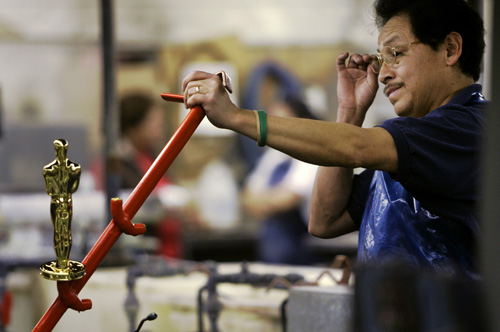Oscars parallel past awards

Pedro Barrera looks over an Oscar statuette after as it comes out of a 24 carat gold bath at the R.S. Owens plant in Chicago, Thursday, Jan. 18, 2007. The Oscars are presented annually at the Academy Awards ceremony in Los Angeles and the Academy uses the (AP Photo/Charles Rex Arbogast)
Jan 19, 2007
Last updated on May 12, 2016 at 07:05 a.m.
NEW YORK – When Jack Nicholson opened the envelope and read “Rocky” as the best-picture winner at the 49th Academy Awards 30 years ago, Sylvester Stallone was caught without his tie.
The actor’s rental bow tie had fallen off on his way to the ceremony, but producers Irwin Winkler and Robert Chartoff still dragged Stallone up to the stage. Stallone may have been caught unprepared for the occasion, but he wasn’t alone – most of Hollywood was surprised, too.
In fitting underdog fashion, “Rocky” upset a legendary class of films. Also up for best picture at the 1977 Oscars were three movies generally considered among the best America has produced: “All the President’s Men,” “Network” and “Taxi Driver.” (Hal Ashby’s Woody Guthrie biopic “Bound for Glory” was the fifth nomination.)
As the 30th anniversary of those Oscars nears, there are a few notable parallels. Stallone has again produced a “Rocky” film (“Rocky Balboa”), though it would be fortunate to win one nomination, let alone the ten that the original did. “Taxi Driver” director Martin Scorsese is again in the hunt with “The Departed.”
Get The Daily Illini in your inbox!
But for many, the 49th Academy Awards remains exhibit A in any argument about the academy’s less than perfect taste – a critique that usually cites the best-picture loss of “Citizen Kane” in 1942 (to John Ford’s “How Green Was My Valley”), Alfred Hitchcock’s lack of a best-director award or Art Carney’s best-actor win in 1975 over Nicholson (“Chinatown”), Al Pacino (“The Godfather: Part II”) and Dustin Hoffman (“Lenny”).
“In hindsight, it looks crazy that, of those nominated films, ‘Rocky’ won – because ‘Rocky’ is the flimsiest by far, and was so at the time,” says film critic and historian David Thomson. “But at the time, there was this stupid notion that Sly Stallone represented a great American success story.”
“It’s a shining example of how silly (the Oscars) can be,” Thomson said.
Sidney Lumet directed “Network,” the darkly satirical portrait of TV news. It won three acting Oscars and best screenplay for Paddy Chayefsky, but the best-picture loss still stings for Lumet.
“I’ve been nominated five times,” the director told The Associated Press last year. “But on two occasions, I got so pissed off about what beat us. With `Network,’ we were beaten out by ‘Rocky’ for Christ’s sake.” (Lumet, who was finally awarded an honorary Oscar in 2005, also mentions the best picture win for “Gandhi” over his “The Verdict” in 1983.)
“Rocky” has almost certainly affected American culture more than the other three nominees.
There is a statue of the film’s main character in Philadelphia, after all. Propelled by Stallone’s passion for it, the movie opened in limited release in 1976.





